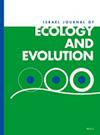Diversity of medium and large-sized mammal species in Chilimo Forest, West Shoa Zone, Ethiopia
IF 0.8
4区 环境科学与生态学
Q3 ECOLOGY
引用次数: 0
Abstract
Abstract Investigating species distribution and diversity patterns is vital for conservation efforts in biodiversity-rich countries such as Ethiopia. The present study examined the diversity of medium and large-sized mammal species in the Chilimo forest, West Shoa Zone, Ethiopia. It was conducted from January 2022 to October 2022 by stratifying the study area into three habitat types: natural forest, plantation, and human-modified forest. A fixed-width line transect sampling method was used to collect the mammalian data. A total of 14 medium and large mammal species belonging to 11 families and six orders, were recorded in the forest during the study period. Of these, 11 were medium, and 3 were large-sized mammals. The Olive Baboon ( Papio anubis ) was the most abundant mammal species, accounting for 41.7 % of the total abundance. The abundance of medium and large-sized mammals varied significantly among the three habitat types (Species × Habitat; Chi-square test of independence; χ2 = 163.385, df = 26, p < 0.001) and between the wet and dry seasons (Species × Season; Chi-square test of independence; χ2 = 43.753, df = 13, p < 0.001). During the dry season, species diversity was the highest in the natural forest and plantation habitat (H’ = 1.76 in both). The natural forest also supported the highest species diversity during the wet season (H’ = 1.57), followed by the plantation and human-modified habitats (H’ = 1.54 in both). An 88% similarity in species composition was observed between the natural and human-modified forests. The occurrence of 14 species of medium and large-sized mammals in the study area calls for immediate conservation actions in collaboration with respective stakeholders to protect the area’s biodiversity.埃塞俄比亚西绍阿地区奇里莫森林大中型哺乳动物物种多样性
研究物种分布和多样性模式对埃塞俄比亚等生物多样性丰富的国家的保护工作至关重要。本研究调查了埃塞俄比亚西绍阿地区Chilimo森林中大中型哺乳动物物种的多样性。研究时间为2022年1月至2022年10月,将研究区划分为天然林、人工林和人工改造林三种生境类型。采用定宽样线采样法采集哺乳动物数据。研究期间共记录到大中型哺乳动物14种,隶属于6目11科。其中,11只中型哺乳动物,3只大型哺乳动物。橄榄狒狒(Papio anubis)是最丰富的哺乳动物,占总丰度的41.7%。3种生境类型中、大型哺乳动物的丰度差异显著(种×生境;卡方独立性检验;χ2 = 163.385, df = 26, p <0.001)和干湿季节之间(物种×季节;卡方独立性检验;χ2 = 43.753, df = 13, p <0.001)。旱季物种多样性以天然林和人工林生境最高(H′= 1.76)。天然林在雨季的物种多样性最高(H′= 1.57),其次是人工林和人工生境(H′= 1.54)。天然林与人工改造林的物种组成相似度为88%。研究区内有14种大中型哺乳动物,需要立即采取保护行动,与相关利益相关者合作,保护该地区的生物多样性。
本文章由计算机程序翻译,如有差异,请以英文原文为准。
求助全文
约1分钟内获得全文
求助全文
来源期刊

Israel Journal of Ecology & Evolution
环境科学-进化生物学
CiteScore
2.10
自引率
0.00%
发文量
7
审稿时长
>36 weeks
期刊介绍:
The Israel Journal of Ecology and Evolution includes high-quality original research and review papers that advance our knowledge and understanding of the function, diversity, abundance, distribution, and evolution of organisms. We give equal consideration to all submissions regardless of geography.
 求助内容:
求助内容: 应助结果提醒方式:
应助结果提醒方式:


